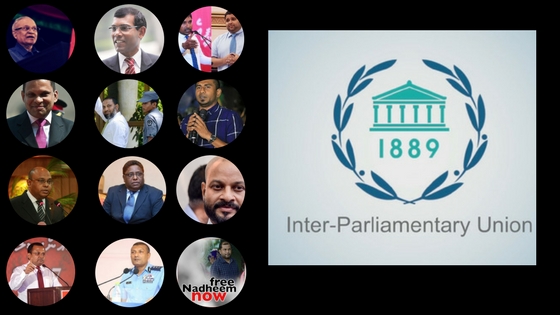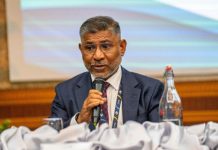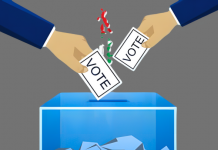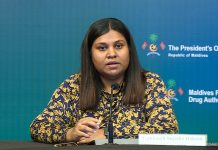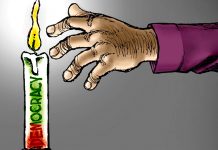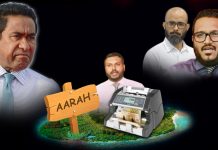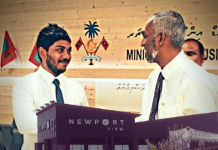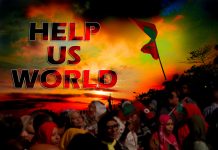The political crisis in Maldives took a further turn for the worse in the aftermath of the ruling by the Supreme Court on 1 February 2018 to release nine high-profile politicians and to reinstate the 12 members of parliament, thereby giving the opposition a majority in parliament. President Yameen has refused to implement the ruling, claiming it to be unlawful, and on 6 February 2018 declared a state of emergency, which was extended by 30 days on 20 February. The opposition and its supporters have protested against the refusal to respect the ruling, have contested the validity of the state of emergency and are boycotting parliament.
More than a dozen members of parliament were arrested under the state of emergency, which expired on 22 March 2018 and was not extended. Most were released shortly after their arrest, although it is not clear whether they are still under investigation. Shortly before the state of emergency expired, the Prosecutor General’s Office announced charges of terrorism – concerning an alleged plot to overthrow the Government – against 11 high-profile individuals, including the four members of parliament Mr. Faris Maumoon, Mr. Abdulla Riyaz, Mr. Abdulla Sinan and Mr. Ilham Ahmed, and ordered that they remain in detention until the end of the trial. Three other members of parliament, namely Mr. Ahmed Mahloof, Mr.Ibrahim Mohamed Solih and Mr. Ali Azim, are also still in detention. While 10 other members of parliament are at liberty, they are facing charges, most of which date back to 2017. The opposition claims that all of this is part of a pattern of intimidation and repression by the authorities.
A delegation mandated by the Committee on the Human Rights of Parliamentarians carried out a mission to Maldives from 19 to 21 March 2018 to address ongoing and new concerns.
- The delegation is deeply concerned about the continued political instability in Maldives, which appears to be the result of a variety of factors, including a “winner-takes-all” political mentality, lack of a culture of political dialogue, reports of widespread corruption, systematic floor crossing in parliament and the absence of a fully independent judiciary and independent oversight institutions. The delegation underscores that the next 12 months, with a presidential election in September 2018 and parliamentary elections in March 2019, are bound to lead to further tension if the underlying causes for the continued political instability and the perceived absence of a level playing field for the participation of presidential candidates are not seriously addressed.
The delegation therefore calls on all political stakeholders in Maldives to decisively work together to effectively address the causes for continued political instability. The delegation also calls on the authorities to do everything in their power to ensure that the planned presidential and parliamentary elections will be free and fair and are perceived as such.
- The delegation considers that the revocation of the mandate of the 12 members of parliament has to be seen in the light of the aforesaid factors causing continued political instability.
The delegation therefore calls on the Maldivian authorities to allow the 12 members of parliament to take their seats in the People’s Majlis as soon as possible.
- The delegation is concerned about the attempts to thwart the no-confidence motion against the Speaker in 2017, in particular the events that occurred on 24 July 2017, including the forcible removal of several members of parliament from the People’s Majlis. The delegation considers that parliament should be accessible to its members at all times, and is therefore deeply concerned that several parliamentarians are still facing legal proceedings for attempting to access the parliament that day.
The delegation therefore calls on the Maldivian authorities to withdraw these charges forthwith.
- The delegation is deeply concerned about the wave of arrests of members of parliament under the state of emergency, the charges brought against four parliamentarians, and their detention until the end of their trial on charges of terrorism. The delegation is also concerned at the continued detention of three other members of parliament.
The delegation calls on the authorities to fully ensure that all members of parliament enjoy the right to a fair trial, and that any cases against them are brought diligently and swiftly before the courts and only when clear evidence is available. The delegation believes that it would be very useful to send a trial observer to the court proceedings in one or more of these cases.
- The delegation has received contradictory information about the conditions of detention of the members of parliament, which it will describe in its full mission report. The delegation regrets, therefore, that it was not allowed to meet the members of parliament in detention to assess their situation.
The delegation trusts that the authorities are taking all the necessary steps to ensure that the detained members of parliament are being kept in proper conditions and have access to their family, lawyers and a doctor.
- The delegation is concerned that, with the opposition boycotting parliament, legislation that falls under Article 87(b) of the Constitution is being passed without half the members being present, as is required. The delegation is also concerned that the ruling parties and the opposition appear to be unable to use parliament as the platform to discuss their differences and find common solutions.
The delegation calls on the parliamentary authorities to ensure that parliament fully abides by the Constitution when conducting its work and calls on all sides to engage in constructive political dialogue. The delegation encourages all sides to make use of the expertise and the platform that IPU can offer to promote such dialogue.

